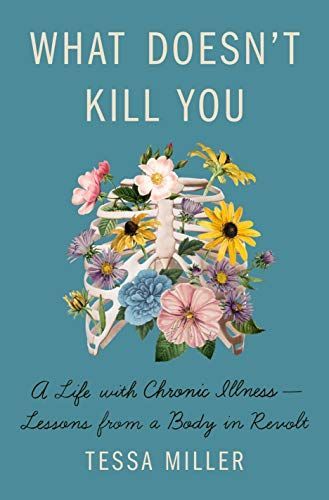
What Doesn't Kill You A Life with Chronic Illness - Lessons from a Body in Revolt
A riveting and candid account of a young journalist’s awakening to a life of chronic illness, weaving together her personal story with reporting to shed light on how Americans live with long-term diagnoses today. Tessa Miller was an ambitious twentysomething writer in New York City when, on a random fall day, her stomach began to seize up. At first, she tried to push through the searing pain, taking time off work and staying home, glued to the toilet. But when it became glaringly apparent something was wrong, Miller gave in to her family’s requests and went to the hospital—and thus started a years-long personal nightmare that included procedures, misdiagnoses, and life-threatening infections. Once Miller was finally correctly diagnosed with Crohn’s disease, she had yet another new battle to face: accepting that she will, in truth, never get better. Today, 3 in 5 adults in the United States suffer from a chronic ailment, whether the illness is Lyme, IBS, Crohn’s, asthma, depression, anxiety, diabetes, or any other chronic ailment. However, despite the prevalence of these illnesses and the impact they have on just about everyone—whether the sufferer is a colleague, a loved one, or you personally—there remains an air of shame and isolation around the topic. Millions endure these diseases alone, not only physically but also emotionally, balancing the stress of relationships and work amidst the ever-looming threat of health complications. Moving from Miller’s maddening yet all too relatable experience into a deeper look at how the medical community handles chronic illness, What Doesn't Kill You exposes the realities of what it means to accept a lifetime diagnosis, pushing past the good, the bad, and the ugly to offer wisdom and solidarity for those trying to make sense of it all.
Reviews
Laura Wilson@bookswithlaura
Erica@ericar13
Bella Tassinari@bellatassinari
Ember Skies@emberexplores
Allison Dempsey@alliedempsey
Kayla S Smith@kayla_sue_kahler
Liz Whitehead@lizwhitehead
Highlights
Laura Wilson@bookswithlaura
Page 129
Laura Wilson@bookswithlaura
Page 98
Erica@ericar13
Page 266
Erica@ericar13
Page 248
Erica@ericar13
Page 244
Erica@ericar13
Page 232
Erica@ericar13
Page 232
Erica@ericar13
Page 223
Erica@ericar13
Page 217
Erica@ericar13
Page 215
Erica@ericar13
Page 214
Erica@ericar13
Page 211
Erica@ericar13
Page 202
Erica@ericar13
Page 196
Erica@ericar13
Page 194
Erica@ericar13
Page 191
Erica@ericar13
Page 187
Erica@ericar13
Page 176
Erica@ericar13
Page 166
Erica@ericar13
Page 147
Erica@ericar13
Page 145
Erica@ericar13
Page 119
Erica@ericar13
Page 104
Erica@ericar13
Page 88